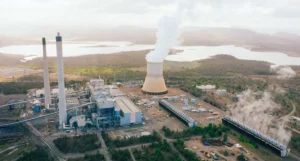One of the big themes of the Paris climate talks has been the focus on renewable energy – wind and solar in particular – as a means to reach emission reduction pledges, and cut pollution in the cities.
Australia’s Coalition government, however, is sticking to a familiar theme: it has invested heavily in fossil fuels with long-life assets it is keen to retain and, anyway, coal is still good for humanity.
Foreign minister Julie Bishop used a forum hosted by Indonesia called “Pathways to a Sustainable Low Carbon and Climate Resilient Economy” to push the case for Australian fossil fuels.

“Right now we are in a transition phase,” Bishop said. “Traditional energy sources, fossil fuels like coal, will remain a significant part of the global energy mix for the foreseeable future.
“Barring some technological breakthrough fossil fuels will remain critical to promoting prosperity, growing economies and alleviating hunger for years to come.”
Hunger? It seems a variation of the “coal is good for humanity” theme, despite repeated estimates by the likes of the IEA, the World Bank and others that suggest the needs of poor countries are probably best served by renewable energy.
The comments yet again underline the disconnect between Australia’s apparent support for a global target of “well below 2°C” and its lack of policies to get its economy beyond the fossil fuel age – few renewables are being built and none of the major coal generators are being closed.
Bishop suggested this would be the status quo.
“It is a fact that energy is the mainstay of our respective countries’ export markets and underpins economic growth,” she said. “The capital stock and infrastructure we have in stock to create and supply energy, both fossil fuels and renewables, have long life spans.” So no early closures then.
The case for higher targets
One thing you won’t hear the Australia government talking about here is the need for long-term targets. All that went when the carbon price was trashed by Team Abbott, and they don’t look likely to be reinstalled any time soon.
In contrast, the US is talking about the need to cut emissions by between 80 and 100 per cent. At least that was the opinion of energy secretary Ernest Moniz, in a presentation on Tuesday that also highlighted the plunging cost of solar and wind technologies, as well as LEDs.
Bishop, on the other hand, lamented the fact that, until recently, solar panels were a bit dodgy. “Not long ago solar power needed massive and inefficient solar panels that stopped working when they got too hot,” she told the forum. “Now we’re on the cusp of using solar fabrics to power a mobile phone.”
Moniz’ talk of 80 per cent reductions puts the US closer to the camp of the Australian Greens than it does to Turnbull’s Coalition. Greens leader Richard di Natale, in Paris for the final week of talks, says the conversation in Australia misses international developments completely.
“The Prime Minister has been given a lot of credit for not being Tony Abbott, but we really have not contributed much on driving the level of ambition required.” Indeed, it seems that the Greens’ own policies are not as radical in the international arena as they are made out to be in Australia.
“What we calling for is absolutely mainstream on the world stage, yet in Australia it is branded as unattainable and too costly.”
Di Natale said of Bishop’s remarks: “You can’t be serious about a serious agreement on climate change, without a plan for a rapid transition away from coal. It’s not just about tackling global warming, we are missing a huge opportunity for the economy.”
You can hear the full interview with Richard Di Natale here;
Australia rated among worst in world for climate action
Meanwhile, a German think tank rated Australia near the bottom of more than 60 countries on their climate change policies and actions. The Climate Change Performance Index, produced by GermanWatch and the Climate Action Network Europe, ranked Australia 59th – just ahead of Kazakhstan and oil producer Saudi Arabia, one spot higher than its position last year.
Saudi Arabia has distinguished itself at these talks by seeking to downplay any ambitious emissions reduction targets, and trying to derail French efforts at a negotiated settlement by insisting on the issues being resolved on the plenary floor. Tellingly, they have been shouted down on those issues by other developing countries, such as The Philippines and South Africa.
In the climate performance survey, Australia got a “very poor”, the lowest of five possible rankings for climate policy, energy efficiency and renewable energy, with a “moderate” ranking for development of emissions. Australia came in last in the OECD group of wealthy nations and well below neighbours New Zealand, ranked 42 and Indonesia ranked 24.
“This again proves that Australia’s rhetoric in Paris does not match its actions. It is an embarrassment to Australians and a worrying sign to our neighbours, many of whom are suffering the worst impacts of climate change,” Oxfam Australia CEO, Helen Szoke, said.
Paris talks wait for French text
There’s a lot of speculation about what may or may not be included in the final text, but a clear indication will be given at around noon on Wednesday (around 10pm Sydney time) when the French release their version of the text.
Expect it to be a lot simpler than the 20 pages handed to them on the weekend, with most of the brackets removed apart from some key issues yet to be resolved by the ministers.
Those issues may include the ongoing choice/combination of 2°C and 1.5°C, the definition of decarbonisation/net zero emissions/carbon neutrality, the timing of periodic reviews, finance, and the old thorny issue of differentiation (i.e. the split of responsibility between developed and developing countries.
Some of the most notorious members of the G77 – namely Cuba, Venezuela and Malaysia – sought to derail the French diplomatic machine on Monday night with a series of procedural moves. They wanted to work through the text on a big screen, an idea dismissed by one negotiator as likely to take a lifetime.
But they got put firmly in their place, firstly by Marshall Islands and then by South Africa. There is still strong optimism on a good deal, it just depends how much has to be diluted to get everyone on board.
But as Howard Bamsey – the former Australian climate ambassador and head of delegation who has been to 19 of these COPs – told RenewEconomy, things have changed. COP21, away from the negotiating rooms, now resembles more of a giant trade show, with business deals being done all over the place, strong indications that what the governments do matters less, the technology is now driving change.
Africa attracts $10 billion in finance for wind and solar plan
One such deal announced on Tuesday was $US10 billion worth of funding for the initiative to build 10,000MW of additional renewable energy on the African continent by 2020. Germany will contribute $US3.25 billion, France $US2.2 billion, Sweden $US500 million and Canada $C110 million to the initiative.

Greenpeace says its investigators, posing as representatives of oil and coal companies, asked academics from Princeton and Penn State to write papers promoting the benefits of CO2 and the use of coal in developing countries. It said the professors agreed to write the reports and said they did not need to disclose the source of the funding.
Greenpeace said the investigation exposes a “network of academics-for-hire and a back channel that lets fossil fuel companies secretly influence the climate debate while keeping their fingerprints off.
“The question now is very simple. Down the years, how many scientific reports that sowed public doubt on climate change were actually funded by oil, coal and gas companies? This investigation shows how they do it, now we need to know when and where they did it. It’s time for the sceptics to come clean.”








